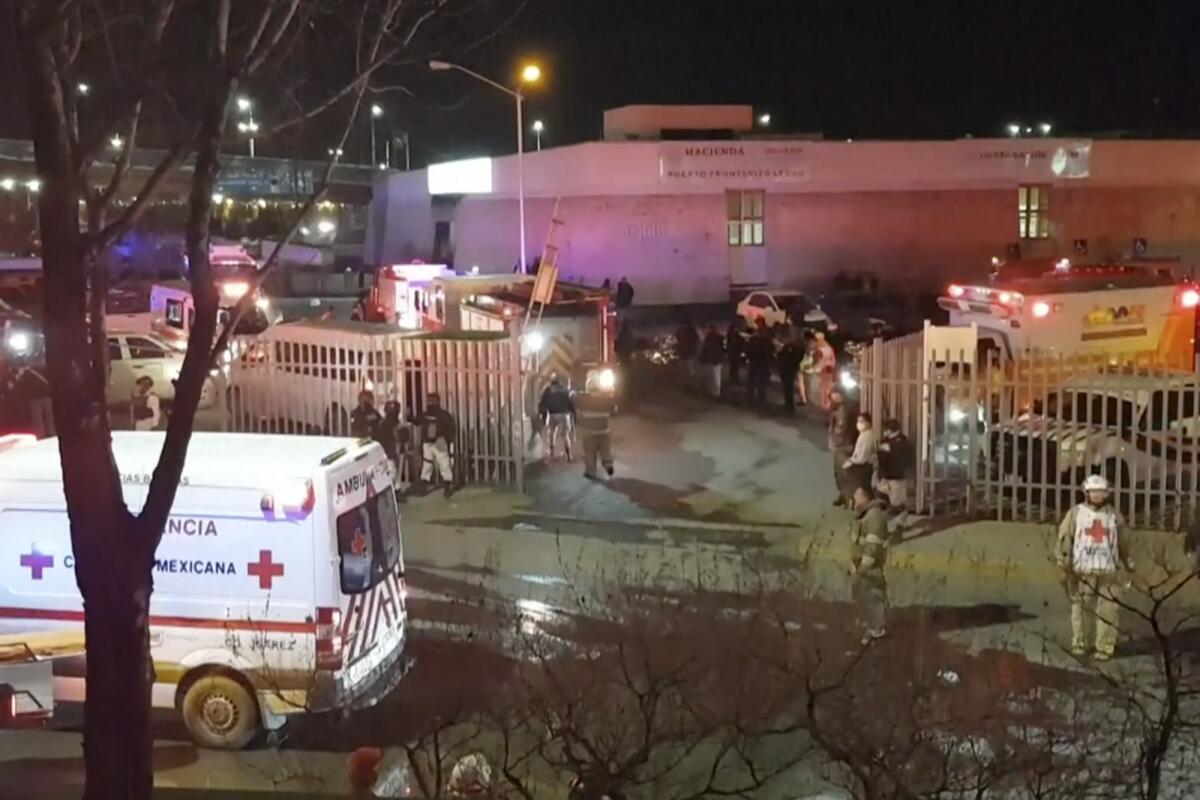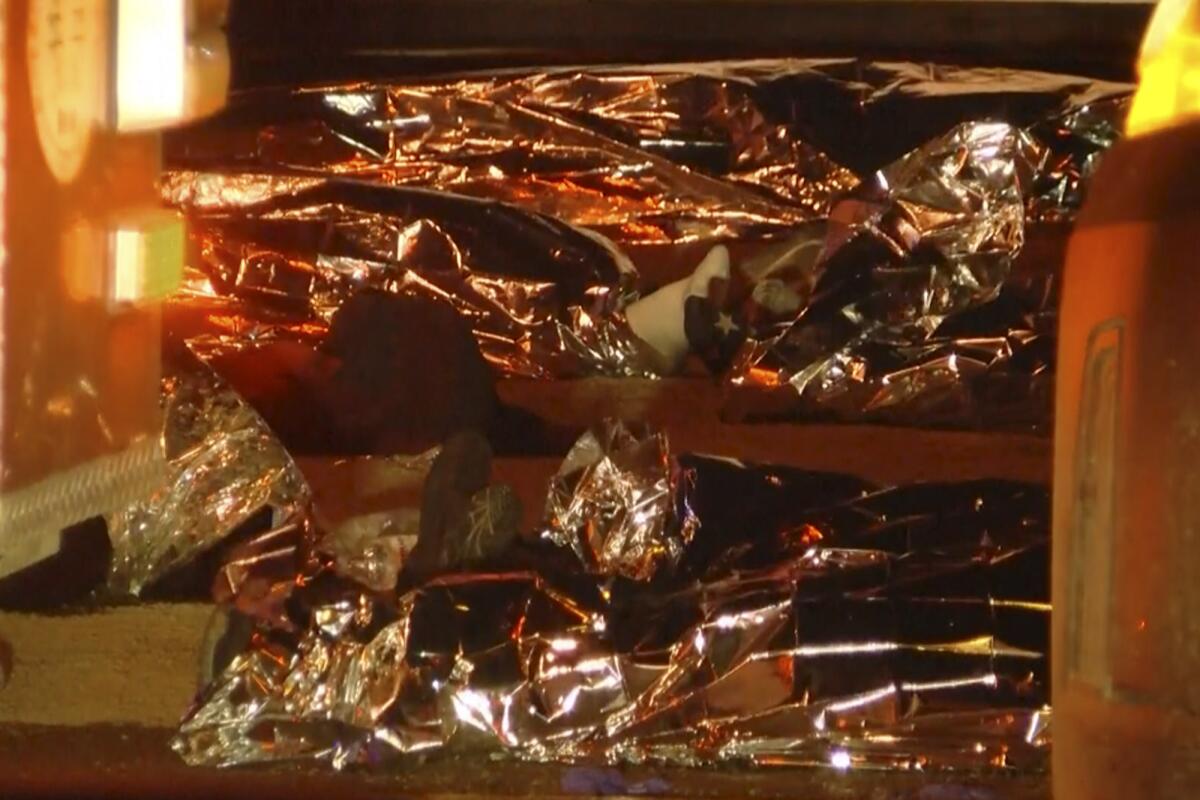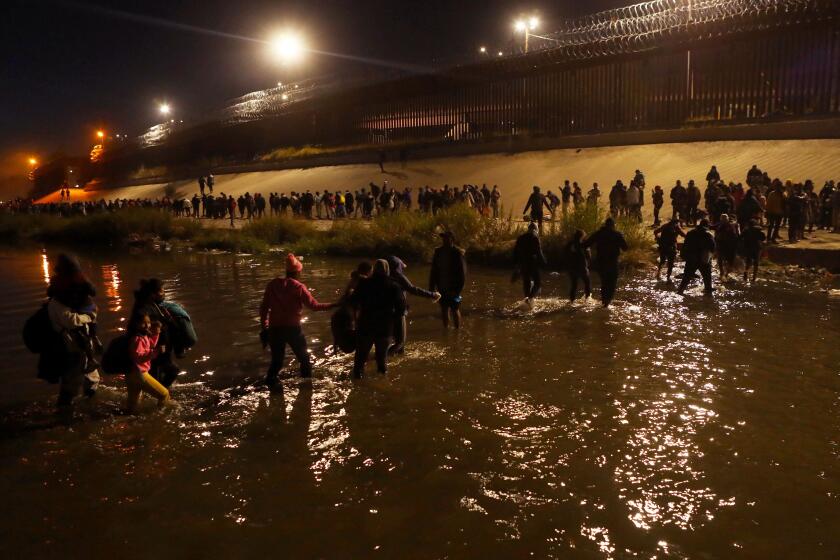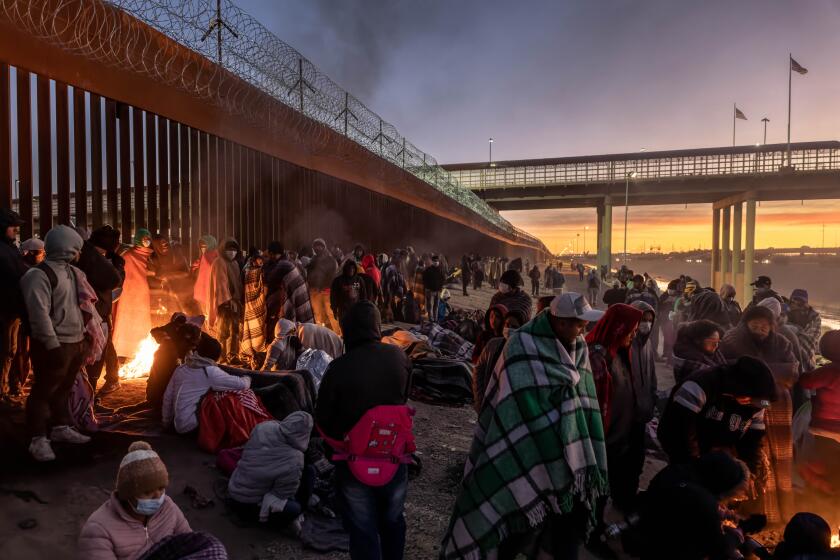At least 38 migrants killed in a fire at a detention center in Mexico

- Share via
CIUDAD JUAREZ, Mexico — The surveillance video is short, but brutal.
Taken from inside a migrant detention center in northern Mexico, it shows flames spreading quickly inside a locked cell, and detainees pleading for help.
As black smoke billows, several guards are seen hurrying away without attempting to rescue the prisoners from the growing fire.
At least 38 migrants were killed and dozens more were injured Monday night in the blaze at a National Migration Institute lockup in Ciudad Juarez, just south of the U.S. border, according to authorities.
It was the deadliest incident in recent memory at Mexico’s notoriously crowded immigration holding centers and another reminder of the many perils faced by migrants trying to reach the United States.
Mexican President Andrés Manuel López Obrador said the fire began around 10 p.m. after migrants learned that they were going to be deported to their home countries — and ignited mattresses in protest. He said most of the dead were from Central and South America.
“They never imagined it would cause this terrible tragedy,” López Obrador said.
A Mexican federal official with knowledge of the case who spoke on condition of anonymity offered a different motive for the protest, saying it began because 68 men were packed into a cell meant for no more than 50 people — with no access to drinking water.

The fire provoked outrage on both sides of the border, with migrant advocates blaming U.S. and Mexican authorities for policies they called inhumane.
“It’s not like these incidents just happen out of thin air,” said Stephanie Leutert, director of the Central America and Mexico Policy Initiative at University of Texas at Austin and a former Biden administration official. “You’ve got the U.S. and Mexico’s restrictive immigration policies and border enforcement efforts that create the conditions.”
As President Biden visits El Paso, thousands of people who fled oppressive countries are marooned in Mexico in the wake of his expansion of a Trump-era policy.
Many said the fire is evidence that Mexico is not equipped to manage and care for the record number of people who have been stranded in the country while trying to reach the United States in recent years. Advocates warn that the crisis is likely to worsen this summer, when the U.S. rolls out a new policy to turn back even more asylum seekers to Mexico.
“As the U.S. continues to implement policies that push asylum seekers back into Mexico, humanitarian infrastructure in the country is increasingly strained and more people are stuck in highly vulnerable situations,” said Rafael Velásquez of the International Rescue Committee.
Rescuers spent hours Monday night and early Tuesday morning pulling remains from the burned building. Bodies, wrapped in silver thermal blankets, were lined up on the ground.
On Tuesday, U.S. border officials said that they would be allowing victims of the fire to enter the United States to receive medical treatment.
The detention center was still smoldering in the afternoon as dozens of migrants descended on the site to demand information about loved ones who they feared had perished inside.
“They were left to die!” one migrant shouted at authorities.
“Why do they treat us like dogs?” another asked.
Katiuska Márquez, a 23-year-old Venezuelan, was desperately searching for her brother, 30-year-old Orlando Maldonado.
She said that they both had been detained Monday along with her husband and their two young children. Their crime: begging for money for food along a busy Juarez street.
Márquez, her husband and the children were eventually released because the Mexican government is not equipped to detain families. But she said her brother was taken to a room at the center packed with many other men. She said she spoke to him briefly through a set of steel bars.
“I managed to see my brother and he told me, ‘Don’t let me die, get me out of here,’” she said. “But what could I do? My words don’t count for anything here. So I left.”
When she heard about the fire, she rushed back to the center, eager to tell authorities about the tattoo of a crucified Jesus Christ on her brother’s right arm. They said that they had no information about him but that if he survived, he may have been taken to another immigration center or to one of several area hospitals. Márquez said she lacked the bus fare to go search for him.
The death count was still in flux Tuesday, with the government reporting 40 victims at one point before revising that to 38.
According to the Mexican attorney general’s office, the dead and injured included 28 Guatemalans, 13 Hondurans, 12 Salvadorans, 12 Venezuelans and one citizen each from Colombia and Ecuador.
It was unclear whether some of the migrants had been previously deported from the United States.
In recent months, northern Mexican cities have been overwhelmed as a result of recent Biden administration policies that limit the ability of migrants from four countries — Venezuela, Nicaragua, Haiti and Cuba — to seek asylum at the border without first making an appointment via a smartphone application. The system has been riddled with glitches and offers limited appointments, which fill up within minutes.
Some migrants have waited months at the border.
Tensions have been particularly high in Juarez, where shelters housing people hoping to cross into the United States are overflowing and stranded migrants have been asking for food and money in major intersections and sleeping on the sidewalk near border crossings into El Paso.
“We have exceeded our capacity to provide attention,” said Miguel Angel Gonzalez, president of a church-based network of shelters in Juarez. He said his network’s 15 shelters have been completely full for the last six months.
City officials have publicly criticized the migrants, with Juarez Mayor Cruz Peréz Cuéllar recently imploring residents to not give migrants money, insisting that they can find work.
In a March 9 letter, several dozen migrant advocacy groups urged the city to investigate abuses by police and immigration officials. They said that during arbitrary detentions, officials have questioned migrants about their legal status, extorted and stolen money from them and destroyed their documents.
The letter described an incident in early March in which they said police violently and arbitrarily detained migrants in a downtown cathedral as well as another incident the following week in which members of the army, the national guard and the city police swarmed a hotel where migrants were staying, sending “a clear message of intimidation.”
Tensions boiled over a few weeks ago when hundreds of people — mostly from Venezuela — tried to force their way across an international bridge to El Paso before they were stopped by U.S. authorities.
The numbers of migrants in cities such as Juarez are expected to grow in coming months as the Biden administration prepares to implement a new policy that would further restrict access to asylum at the border.
Throughout the COVID-19 pandemic, federal officials have used a public health measure called Title 42 to prevent migrants from seeking asylum at the border and to quickly expel those who attempt to enter the United States.
The union’s decision to oppose Biden’s asylum proposal is one indication of the plan’s similarities to Trump-era efforts.
With that border policy set to expire in May, the Biden administration last month unveiled a new plan that would make migrants ineligible for asylum if they enter the U.S. without permission and fail to apply for protection in another country on their way. Some could still request asylum at an official port of entry, but would generally be required to do so using the smartphone app.
Human rights advocates say the new system is likely to strand even more people along Mexico’s famously treacherous migrant trail.
In recent decades, migrants trying to cross Mexico have died at the hands of organized crime, as well as while riding atop cargo trains and while packed into overcrowded trailers lacking ventilation.
They have also faced abuse from immigration agents, advocates say. Mexico’s immigration agency said this year that 105 of its agents had been reported to the internal affairs office for corruption.
The deadly fire was the most dramatic illustration to date of the crisis that has engulfed Mexican border cities and towns since successive U.S. administrations — under Presidents Trump and Biden — strong-armed Mexico into taking back U.S.-bound migrants arriving at the international line.
Yet despite U.S. efforts at deterrence, migrants have not stopped trying to reach the border. Tens of thousands of people continue to stream north, fleeing poverty, conflict and political repression.
Panama’s government said last week that 50,000 migrants entered the country from Colombia through a treacherous stretch of jungle known as the Darien Gap in the first two months of 2023, five times more than in the same period last year.
“Mexico is the last mile for people facing humanitarian crises around the world,” said Velásquez, of the International Rescue Committee.
Mexico’s migrant detention centers have seen protests over conditions from time to time. Last year, riots broke out at a detention center in the northern border city of Tijuana and another in the southern city of Tapachula. A 2020 fire at a migrant facility in the southern town of Tenosique killed one migrant and injured others.
Felipe Gonzalez Morales, the United Nations’ special rapporteur on the human rights of migrants, also blamed the fire on government policies.
“The extensive use of immigration detention leads to tragedies like this,” he wrote on Twitter. “The immigration detention of adults, in accordance with International Law, should be an exceptional measure and not a general one.”
At a special Mass in Juarez on Tuesday for victims of the fire, Bishop José Guadalupe Torres Campos implored his parishioners to remember that a migrant “is a person, not a statistic, ... a child of God who must be treated with dignity, respect and love.”
“Enough,” he said of policies that dehumanize immigrants. “What is happening to us? What have we become?”
Times staff writers Linthicum and McDonnell reported from Todos Santos, Mexico, and Ciudad Juarez, respectively, and special correspondent Minjares from Ciudad Juarez. Staff writers Leila Miller and Cecilia Sánchez Vidal in Mexico City, Andrea Castillo in Washington and Hamed Aleaziz in Healdsburg, Calif., contributed to this report.
More to Read
Sign up for Essential California
The most important California stories and recommendations in your inbox every morning.
You may occasionally receive promotional content from the Los Angeles Times.












